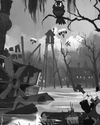
Genesis LPMud is one of the oldest online multiplayer games in the world: It’s been running for nearly 30 years. But six years ago it almost came to an end. This is the story of how an enthusiastic cadre of fans rallied to save it from extinction.
MUD (Multi-User Dungeon) was created by Roy Trubshaw and Richard Bartle at the University of Essex. It was a text-based fantasy adventure that multiple users could play over the university’s network. The first version was made in 1978, but in 1980 the university connected to ARPANET, the precursor to the internet, and MUD became the first online multiplayer RPG.
The original MUD, also known as MUD1, closed down in 1987, but it spawned a whole host of imitators, including Genesis LPMud. Genesis was made by the Computer Society at Chalmers University in Gothenburg, Sweden, and the ‘LP’ stands for Lars Pensjö, who created the game’s programming language—and who still materializes to rescue players from death whenever they get killed in the game. Genesis launched in 1989, and it’s been going ever since. US-based Cooper Sherry, aka Gorboth, is the current ‘Keeper’ of Genesis, the leader of the volunteer band of developers, or ‘Wizards’, who keep the game running. “We’ve never had a paid staff,” he says. “Nobody ever pays anything to play the game, so it’s all just hobbyists, creating the content as they have time.” He notes that little of the 1989 version of the game remains, “other than the oldest bones on which we still build the code structure”, but there is still content in the modern game that dates all the way back to 1992.
This story is from the {{IssueName}} edition of {{MagazineName}}.
Start your 7-day Magzter GOLD free trial to access thousands of curated premium stories, and 9,000+ magazines and newspapers.
Already a subscriber ? Sign In
This story is from the {{IssueName}} edition of {{MagazineName}}.
Start your 7-day Magzter GOLD free trial to access thousands of curated premium stories, and 9,000+ magazines and newspapers.
Already a subscriber? Sign In

"The War Within itself has kept me coming back most evenings too"
WORLD OF WARCRAFT remains my jailer, and I couldn't be more pleased about it

OK BUILDER
SATISFACTORY is the new titan in building and crafting games

HELL YES
DIABLO IV: VESSEL OF HATRED is a transformative expansion

MOUSE: PI FOR HIRE
This mouse wants to be more than just a gimmick

WINDBLOWN
Dead Cells dev's new roguelike has me afraid for my free time

NO MORE ROOM IN HELL 2
As the zombie horde surrounded me just moments after taking down my two remaining teammates, the writing was really on the wall. Armed with just a chef's knife, it was clear I stood no chance, but I was going down swinging, hoping for a miracle... it didn't come.

OWNED BY STEAM
VALVE cordially reminds you that your games aren't yours

CURSE OF THE AZURE BONDS
These classic games haven't aged badly, but I sure have.

DEEP FREEZE
Endure a blizzard of tough choices and rough consequences in FROSTPUNK 2

NEW HORIZONS
Building up REMNANT 2 outside the live service game grinder